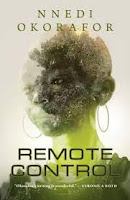Like the sun above, today’s market for fiction, regardless of the “scientific” variety or not, is shining across all cultures and ways of life. Representation, in all its etymological permutations, is not a problem. Readers of science fiction can essentially close their eyes and point, and there will be a book or story waiting when they open their eyes. Should the finger land on Nnedi Okorafor’s 2021 novella Remote Control, one finds a science fantasy of African female bildungsroman proportions.
Remote Control is the story of Sankofar, a young woman in some future African timeline. Little to her knowledge, her life gets flipped upside down as a child when she comes into possession of an alien artifact she calls the seed. Granting powers the Ghanian girl would rather not have, she comes to have the nickname ‘Death’, as just a touch of her glance can wipe out entire villages. A tragic situation forcing Sankofar into exile, it becomes her own responsibility to re-find her “magic” in life.
Indeed, Remote Control is short-form, coming-of-age fiction that plays in a lot of the same space as Okorafor’s Binti series. Remote Control distinguishes itself from that series, but shares some DNA. Not precisely a straight-forward story, Okorafor makes the story interesting by editing the timeline (at least initially). Readers are thrown into Sankofar’s life in situ, after which the timeframe switches to her childhood to bring readers up to date. Done effectively, it creates tension. But does it add anything? In hindsight, one has to wonder whether, given the folktale tone of the novella, whether it would not have been better to start from Sankofar’s childhood… But I digress.
A facet of the novella some readers will find engaging and others frustrating is the fluid manner in which Okorafor introduces and plays with the fantastical elements. Colorful regardless point of view, Okorafor interweaves elements of life in Ghana, unique characters, and random bits of science fiction/fantasy. Like a river, each bend and twist takes the reader to new places and people. Readers looking for some overarching structure or consistency will be left wanting. For me personally, I appreciated the smooth manner in which Okorafor transitions the story through said elements. Science fiction/fantasy need not be a cut and dry affair, and Okorafor’s loose approach adds an organic feel to the story.
In the end, Remote Control is a bit difficult to gauge given the current socio-political climate. In many ways it aligns with a lot of political expectations of left-leaning readers and organizations: minority female protagonist who comes to terms with newfound powers, African setting, and a folktale-esque mode. There are many similar stories on the market today, not the least of which is Okorafor’s own Binti series, which makes the reader wonder how much Okorafor is pushing the envelope here. Judging the book solely on what it is, however, one finds a colorful setting, dynamic story, and a relatable set of characters and circumstances (sans the speculative elements, of course) that reads smooth and easy. Thus, take the novella at that. The reader’s own interest can be gauged accordingly.


No comments:
Post a Comment